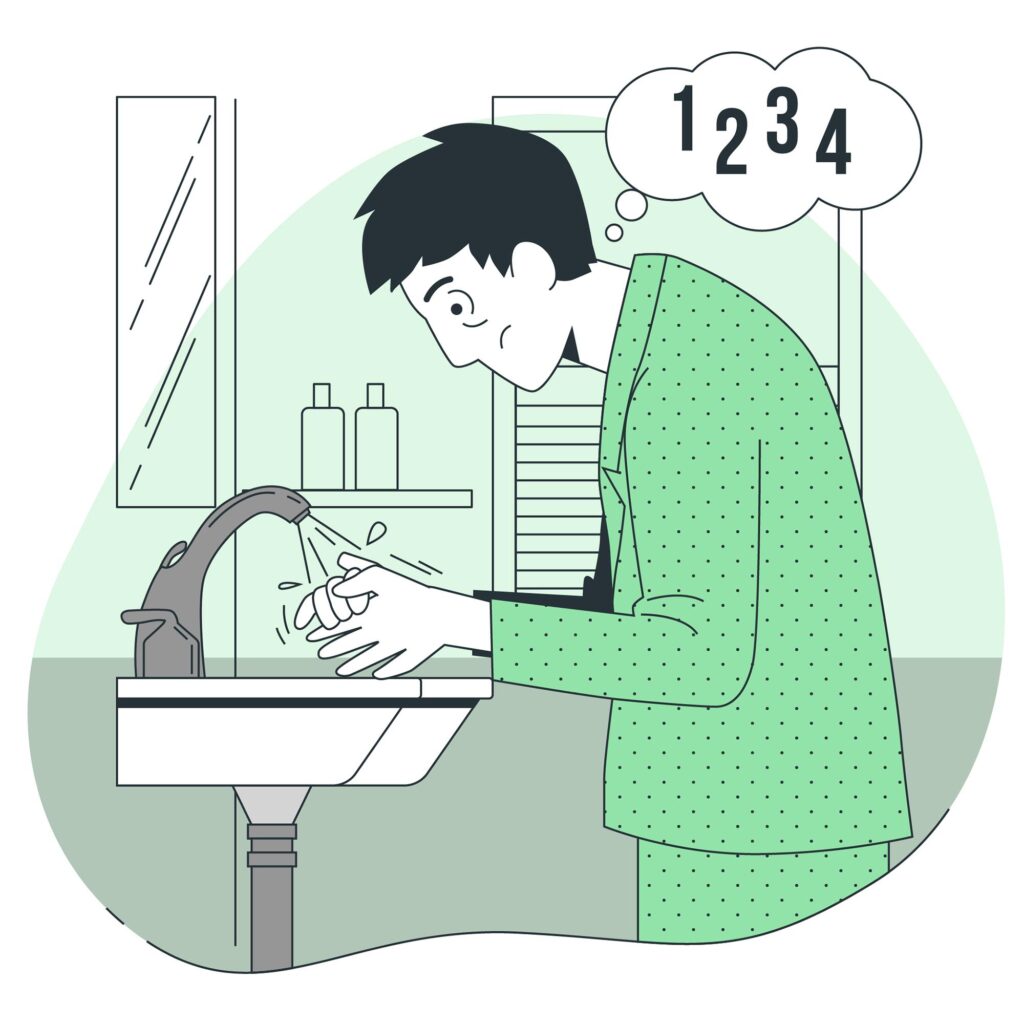Obsessive-compulsive disorder (OCD) is a mental condition where an individual might face repetitive intrusive thoughts that leads to some compulsive routine or activity to be followed. When we say intrusive, it is something that occurs to everyone’s conscious mind and more importantly- it always occurs unwelcomed.
People tend to struggle with intrusive thoughts, frightening situations, and unexpected negations popping out in their minds every time. And it eventually leads the person to form very bizarre routines as a reaction to counterfeit their thoughts. It goes on and on like a vicious circle which seems to have no end.
“The need for cleanliness and perfection is NOT OCD”
While OCD was once accounted as one of the rarely occurring psychiatric diseases affecting a small proportion of people – it is recently a major mental disorder which when left untreated can cause many conditions like depression, anxiety, and eating-related disorders as well.
Causes of OCD
The exact cause of OCD is not understood in depth by psychologists even today. Some of the reasons that may cause the triggering of such emotions may include:
- Family related traumas or any disturbing sight or experience during childhood.
- It is sometimes also termed as a side effect of depression, anxiety, and stressful thoughts of panic attacks.
- It results from excessive intake of alcohol or prolonged drug abuse as well.
- Environmental issues that cause certain infections can also trigger sanitation based OCD amongst various people.
- OCD can also be a genetically inherited disorder as well.
Myths Revolving Around OCD
Overcoming OCD thoughts is a tough process, but finding the right condition and cues can help you in the recovering process faster. Myths revolving around this disease are countless and are often a major hurdle in finding out the actual cause of obsessive-compulsive disorder. Let us be a myth buster first, and a healer then!
- Everyone has a little OCD
There is no such thing as a little OCD! People who had associated OCD with the need for excess cleanliness and perfection of doing things have tremendously built up the myth. While OCD can trigger symptoms of cleanliness and sanitation around, it causes a different reaction such as washing hands a lot many times, avoiding restrooms, and even not eating out of anyone else’s belongings. While these symptoms are definitely a cue, the need for cleanliness and perfection is NOT OCD!
- OCD is just unreasonable fear
While intrusive thoughts are a part of everyone’s life with so many expectations and outcomes, OCD is not. When people acknowledge someone’s OCD with irrational fear, it demonstrates the shallow knowledge they have on the disease. OCD tends to keep people’s mind occupied with sheer negative outcomes and scary thoughts, they are not a doing of our conscious brain. It tends to stay no matter how much we try to avoid it. Just not thinking about the fears won’t ever eradicate OCD.
- OCD is not a real disease
This myth is absolutely the most to be eliminated and pondered about. While people have always conditioned OCD with people who check their gas stoves 3-4 times or people who check cracks on roads before stepping, we have normalized the trend to joke about this disease. What we need to understand is that we have never gone through the same situation that a person really suffering goes through. So the least we can do is to normalize the disease.

Overcoming OCD
Overcoming OCD is doable but not easy. While everyone recommends special medical attention and treatment for this disease, we will try to overcome this condition with special home care and lifestyle modifications. It goes a long way and is not a guaranteed way to remove the disease altogether, but we assure you that these methods can help you with extreme intrusive thoughts and behavior.
- Exercise- Exercise can go a long way which takes your mind off negative thoughts and lets you focus on your wellbeing. It releases endorphins which help to calm the body.
- Abstaining from Triggered Situations– A person with OCD can necessarily seek to avoid situations that tend to trigger their thoughts. It helps in keeping their mind off of it.
- Seeking reassurance- Being a loved one, it is our absolute duty to assure the person that nothing bad can come out of the intrusive thoughts they are having in their mind. It is absolutely comforting – constant support to an OCD person can help them regain confidence in the risk taking factors.
- CBT and ERP – Exposure and Response Prevention (ERP) is one of the most effective and professional method to get rid of OCD. It involves the confrontation of intrusive thoughtsand fearful situations and abstaining from performing its compulsive reaction. It is difficult to practice, but its continuous use can lead the person to feel less triggered with OCD. Cognitive Behavioral Therapy (CBT) is also an effective theory to be practiced with dealing with OCD, but it is mostly used by professionals.
OCD isn’t your lifetime Buddy!
Most people have shown concerns on how to overcome OCD intrusive thoughts, but we have to accept the fact that it is best treated by a professional with a very good success rate. Preferring professional help is always the best remedy when it comes to mental health, as it is absolutely delicate and of very little knowledge to most of the people.
“We have to accept the fact that no one in this world is perfect”
Being a loved one, always look out for cues when you have a hunch that a person around you is showing OCD symptoms. Making the person aware of their own situation can be the biggest first step in the road of its elimination.
We have to accept the fact that no one in this world is perfect. Neither are the chances of recoveries for everyone equal. We have to accept the fact that it is possible to slip into the fear sometimes even when we feel we are completely recovered.
Conclusion
Post any home remedial therapy, or even a professional one – it is highly important to lead a well-balanced life with lots of sleep, nutrients, and mental peace regulating our body. It is the key to unlock a happy life forever.



